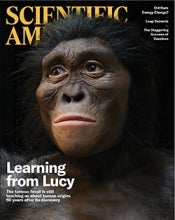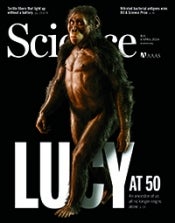Lucy at 50: An auspicious year; not over yet

Chris Campisano (far left), Hadar Research Project director, and Donald Johanson (far right), examine fossils collected in 2024 from the Hadar Research site. Photo by Stephen Filmer/ASU Media Relations
With the goal of raising awareness of how our past connects to the human global future, during 2024, the Institute of Human Origins at Arizona State University has focused on public outreach about the 50-year ongoing impact of the discovery of one of the most important fossil skeletons of the last 100 years — “Lucy.”
Over the past year, the Institute of Human Origins has led a trip with supporters to Lucy's discovery site in Ethiopia with institute Founding Director Donald Johanson; hosted an international symposium that was viewed in person and online by over 1,500 people; celebrated the anniversary with 280 guests at the Phoenix Zoo for a gala dinner; engaged an auditorium of attendees at the Mesa Arts Center for a lecture by Johanson; and helped to organize and participate in a conference in Addis Ababa, Ethiopia, for the “Golden Anniversary” of the Lucy discovery by the Eastern African Association of Paleoanthropology and Paleontology, which included remarks by Ethiopian Prime Minister Abiy Ahmed.
Institute of Human Origins Director Yohannes Haile-Selassie and Johanson also co-authored the cover story for Scientific American magazine, "Learning from Lucy," that was issued for the November 2024 publication.
Science Magazine also published an article that featured Lucy on its April 2024 cover — "Lucy at 50," in addition to coverage by a variety of other popular and scientific media.
To round out this year of education outreach and public events, the institute has these “grand finale” offerings.
Nov. 1: The institute will host geneticist and Nobel Laureate Svante Pääbo at the Walton Center for Planetary Health. Pääbo will talk about “archaic genetics.” More information.
Nov. 6: An exhibition about “Finding Lucy” will open in the Museum of the Human Story in the School of Human Evolution and Social Change. The exhibit will feature two Lucy’s — a “full flesh reconstruction” and a companion “walking Lucy” skeleton. The opening night will feature talks by Haile-Selassie and Chris Campisano, associate director of the Institute of Human Origins and director of the Hadar Research Project. The exhibit will be open through Feb. 28, 2025.
Nov. 6 will also be the first showing of the half-hour Arizona PBS program, “Lucy’s Lasting Legacy,” produced by ASU Media Relations in conjunction with the Institute of Human Origins. The program features scientists from around the world talking about the impact of the Lucy discovery on the science of human origins over the last 50 years. The episode will be shown again on Arizona PBS on the 50th anniversary date of the discovery, Nov. 24.
Nov. 7: Curtis Marean, institute research scientist and Foundation Professor with the School of Human Evolution and Social Change, will give the penultimate lecture for the Lucy 50th anniversary monthly lecture series. Marean will talk about “The Great Human Diaspora.”
Nov. 14: Johanson will appear “In Conversation” with New York Times science columnist Carl Zimmer, onstage at the famed New York venue 92nd Street Y. General admission and online viewing tickets are available at the 92nd Street Y online box office.
Dec. 5: Haile-Selassie will give the final presentation wrapping up the lecture series with his talk “The Institute of Human Origins: Setting the stage for the next 50 years.” All monthly lectures for 2024 can be found on IHO’s YouTube channel.
The institute’s 43-year-long mission for human origins research, teaching and public outreach will continue long after the Lucy 50th anniversary year. Understanding how humans became the flexible, adaptable, culture-based, technology creators that we have been over the past few million years may help our descendants in their existential soul-searching for answers to human-caused challenges in the future.
More about the Lucy 50
The crown jewel: Finding a complete skull for Lucy
When art meets science: Bringing Lucy to life
The tiny bone that led to a very big discovery
'Lucy' and the origins of humans
50 years later, international experts discuss importance of 'Lucy' discovery at ASU symposium
'Lucy' discovery turns 50: 'A Year for Human Origins'
Spotlight page on ASU News: news.asu.edu/spotlight/lucy-at-50
More Science and technology

From food crops to cancer clinics: Lessons in extermination resistance
Just as crop-devouring insects evolve to resist pesticides, cancer cells can increase their lethality by developing resistance to treatment. In fact, most deaths from cancer are caused by the…

ASU professor wins NIH Director’s New Innovator Award for research linking gene function to brain structure
Life experiences alter us in many ways, including how we act and our mental and physical health. What we go through can even change how our genes work, how the instructions coded into our DNA are…

ASU postdoctoral researcher leads initiative to support graduate student mental health
Olivia Davis had firsthand experience with anxiety and OCD before she entered grad school. Then, during the pandemic and as a result of the growing pressures of the graduate school environment, she…

